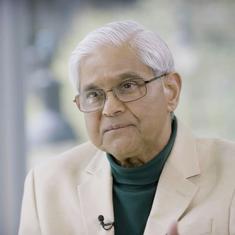Beirut blasts: Anti-government protestors clash with forces, Macron calls for international inquiry
The protestors accused the government of negligence that brought on the explosions, destroying entire districts in Beirut.

Protestors in Beirut on Thursday clashed with Lebanese security personnel at anti-government demonstrations triggered after the twin explosions in the capital city, reported BBC. The blasts, which occurred on Tuesday, killed at least 137 people and wounded nearly 5,000.
The protestors accused the government of negligence that brought on the explosions, destroying entire districts in Beirut. Several homes and businesses were damaged due to the force of the explosions. Videos of the powerful explosion on Tuesday showed an orange cloud in the city’s skyline that devastated the harbour and shattered windows several kilometres away. Buildings 10 km away from the site of the blast were damaged.
Security forces fired tear gas to control the demonstrators on Thursday. The country’s news agency said that 16 people had been taken into custody as part of an inquiry that the government announced this week.
Lebanon’s Foreign Minister Charbel Wehbe said that the committee looking into the blasts has been asked to establish the reason for the incident within four days, Al Jazeera reported.
Since Tuesday, two government officials, MP Marwan Hamadeh and Lebanon’s envoy to Jordan Tracy Chamoun quit from their positions. The two politicians reportedly cited the need for a change in leadership in light of the blasts.
On Thursday, French President Emmanuel Macron assured the people of Lebanon that financial assistance to rebuild the city would not go to “corrupt hands”. He urged Lebanon’s political leadership to bring about reforms and claimed that the country would otherwise fall into a deep crisis. Macron also recommended an international inquiry into the disaster, according to Reuters.
The French president also met Lebanon’s President Michel Aoun, Prime Minister Hassan Diab and Speaker of Parliament Nabih Berri. During his visit, Macron met members of the civil society and political parties at the French ambassador’s residence.
Meanwhile, United Nation’s agencies have been trying to help the victims of the blasts in Beirut. The incident has already taken a toll on the healthcare system of the country.
A World Health Organization spokesperson said that damage to hospitals has eliminated around 500 beds that could be used to treat the injured. The incident also damaged thousands of personal protective equipment used against the coronavirus.
Following the blasts in Beirut, the government declared a two-week state of emergency in the city. The Lebanese government gave the military the power to put any citizen under house arrest in connection with the explosion. Lebanon’s Interior Minister said that the explosions were most likely caused by a blow-up at a warehouse at the Beirut port where ammonium nitrate was being stored. The compound is commonly used as an industrial chemical and also as an explosive in mining.









